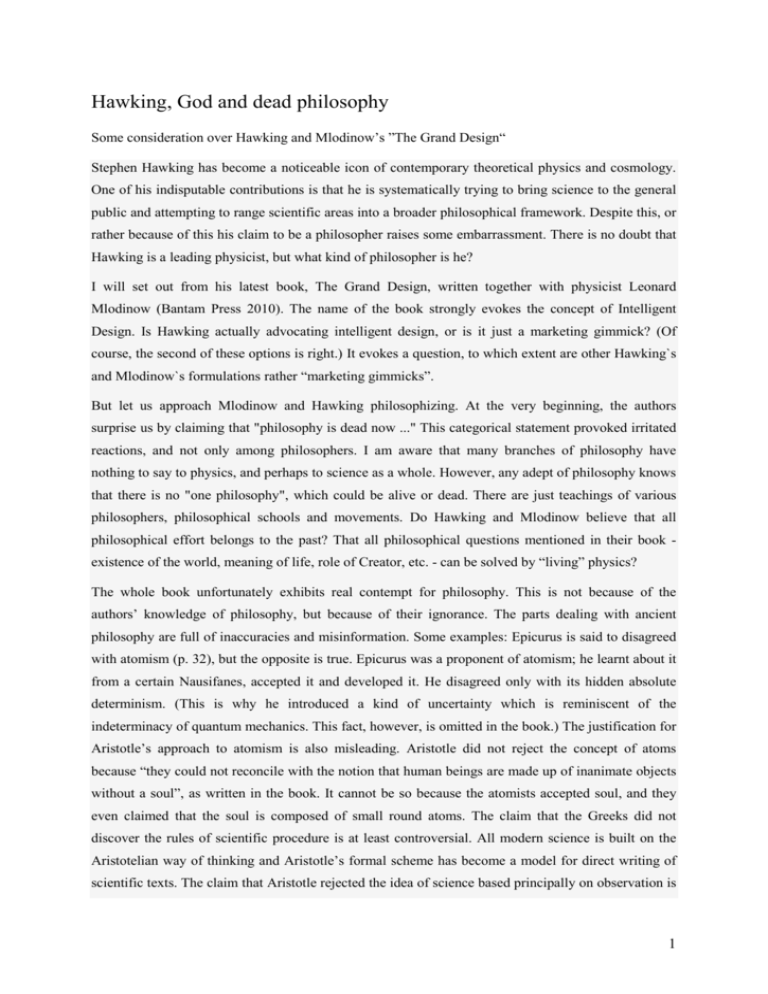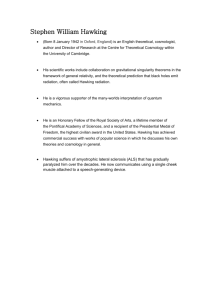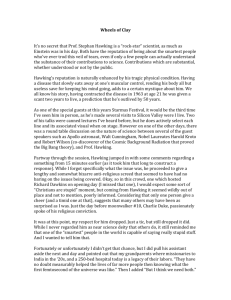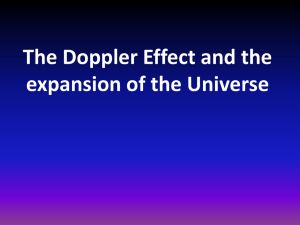Málo velkolepý plán
advertisement

Hawking, God and dead philosophy Some consideration over Hawking and Mlodinow’s ”The Grand Design“ Stephen Hawking has become a noticeable icon of contemporary theoretical physics and cosmology. One of his indisputable contributions is that he is systematically trying to bring science to the general public and attempting to range scientific areas into a broader philosophical framework. Despite this, or rather because of this his claim to be a philosopher raises some embarrassment. There is no doubt that Hawking is a leading physicist, but what kind of philosopher is he? I will set out from his latest book, The Grand Design, written together with physicist Leonard Mlodinow (Bantam Press 2010). The name of the book strongly evokes the concept of Intelligent Design. Is Hawking actually advocating intelligent design, or is it just a marketing gimmick? (Of course, the second of these options is right.) It evokes a question, to which extent are other Hawking`s and Mlodinow`s formulations rather “marketing gimmicks”. But let us approach Mlodinow and Hawking philosophizing. At the very beginning, the authors surprise us by claiming that "philosophy is dead now ..." This categorical statement provoked irritated reactions, and not only among philosophers. I am aware that many branches of philosophy have nothing to say to physics, and perhaps to science as a whole. However, any adept of philosophy knows that there is no "one philosophy", which could be alive or dead. There are just teachings of various philosophers, philosophical schools and movements. Do Hawking and Mlodinow believe that all philosophical effort belongs to the past? That all philosophical questions mentioned in their book existence of the world, meaning of life, role of Creator, etc. - can be solved by “living” physics? The whole book unfortunately exhibits real contempt for philosophy. This is not because of the authors’ knowledge of philosophy, but because of their ignorance. The parts dealing with ancient philosophy are full of inaccuracies and misinformation. Some examples: Epicurus is said to disagreed with atomism (p. 32), but the opposite is true. Epicurus was a proponent of atomism; he learnt about it from a certain Nausifanes, accepted it and developed it. He disagreed only with its hidden absolute determinism. (This is why he introduced a kind of uncertainty which is reminiscent of the indeterminacy of quantum mechanics. This fact, however, is omitted in the book.) The justification for Aristotle’s approach to atomism is also misleading. Aristotle did not reject the concept of atoms because “they could not reconcile with the notion that human beings are made up of inanimate objects without a soul”, as written in the book. It cannot be so because the atomists accepted soul, and they even claimed that the soul is composed of small round atoms. The claim that the Greeks did not discover the rules of scientific procedure is at least controversial. All modern science is built on the Aristotelian way of thinking and Aristotle’s formal scheme has become a model for direct writing of scientific texts. The claim that Aristotle rejected the idea of science based principally on observation is 1 also not valid. On the contrary he was engaged in natural science that was based on observations. Observations served also as a basis for his astronomical conceptions. Aristotle is further said to have accepted geocentrism for "mysterious reasons". Where does this view come from? Geocentrism is nothing but extended egocentrism, and egocentrism is inherent to all living creatures, including us. At first glance it looks more simple, and more natural than any other “centrisms”. No “mysterious reasons” are needed. Furthermore, Laplace is said to have been the first to clearly formulate "scientific determinism" (i.e., absolute determinism). It is not commonly known – not only among physicists – that the same idea was formulated by the Stoics two thousand years before (see e.g., A. A. Long, Hellenistic philosophy). "There is no concept of reality, which would be independent of any concept or theory." This idea, popularized by the movie The Matrix, had also been formulated in antiquity. We should particularly mention the Sophists, then Immanuel Kant, and from contemporary period we should mention Orman Quine ("ontological relativity"), George Bateson, and others. It is also unacceptable to claim that Plato "first questioned the essence of reality". Before him, this had been done by Parmenides ("Consideration and being is the same ...") and many Sophists. (Of course, also by the Buddhists, but the East is generally ignored.) The claim about the death of philosophy is framed by a text containing inaccuracies and misleading statements. Philosophers who oppose the verdict on the death of philosophy point out that Hawking himself is also philosophizing. Not only philosophizing, but also repeating mistakes committed by philosophers before him. In particular, his radical and inadequately self-reflected reductionism is hidden in the central concept of "theory of everything". Taken literally (not only as a marketing gimmick) it is logically inconsistent, if there is no specification of what “everything" means. "All" or “everything” does not form any set that can be unambiguously defined and summarized. (It is a contradictory pseudo concept, as was demonstrated e. g., by the Russell paradox more than one century ago.) Further, Hawking’s declaration that our universe was created out of nothing sounds impressive and looks also in accordance with the Book of Genesis (or with its general interpretation). However, Hawking obviously assumes not the creation from “real nothing”, but “the creation out of empty space”. Nevertheless, since the days of general relativity and quantum electrodynamics, empty space (or a vacuum) has not been “nothing” (really empty, i.e., a void), but “something” – gravitational field, sea of virtual particles, etc. Spontaneous creation is therefore not “creation”, but only “mutation”, as would say Thomas Aquinas. Therefore it cannot be the ultimate answer to the question "Why is there something rather than nothing", because it only shifts the question to "How did the empty space arise?" (The similar is true for divine creation, because "How did God emerge?") 2 One of the main aims of Hawking’s “non-philosophical philosophy” was, perhaps, to show that thanks to M-theory (the importance of which is according to some physicists overestimated) there is no need of any Creator for explanation of physical world. Similar assertion was formulated two centuries ago by Pierre Simone Laplace in his dialogue with Napoleon held over his “Celestial mechanics”. Hawking considerations are, of course, on deeper level of reality. But did Hawking really thing, that existence or non-existence of Got can be proved by means of physics? Fortunately, not all branches of philosophy are dry and barren, but our authors do not mention them. However, there is one thing in which Mlodinow and Hawking are unfortunately right. The gap between philosophy and science is widening. Most philosophers do not understand science. And the Grand Design testifies that even prominent physicists do not understand philosophy. Despite the criticism expressed here, I would like to stress that the Hawking and Mlodinow’s book is definitely interesting and worth reading. I only regret that such respected authors should help spread into the public domain views that degrade philosophy as a whole and support narrow scientism. Peter Zamarovský Czech Technical University, Prague zamarovs@fel.cvut.cz 3







